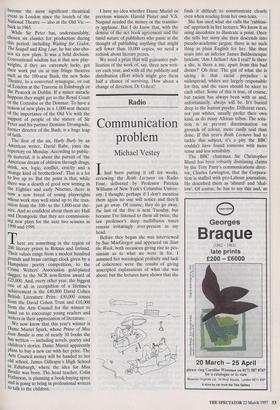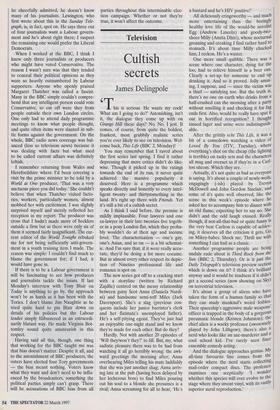Radio
Communication problem
Michael Vestey
Ihad been putting it off for weeks, reviewing the Reith Lectures on Radio Four, delivered by Professor Patricia Williams of New York's Columbia Univer- sity. I thought, perhaps if I don't mention them again no one will notice and they'll just go away. Of course, they do go away, the last of the five is next Tuesday, but because I've listened to them all twice, the law professor's deep mellifluous tones remain irritatingly ever-present in my head.
Before they began she was interviewed by Sue MacGregor and appeared on Start the Week, both occasions giving rise to pes- simism as to what we were in for. I assumed her sociological prolixity and lack of coherence were the results of giving unscripted explanations of what she was about; but the lectures have shown that she finds it difficult to communicate clearly even when reading from her own texts.
She has used what she calls the 'rabbini- cal' approach in her lectures. We know it as using anecdotes to illustrate a point. Once she tells her story she then descends into pseudo-academic jargon; there is no such thing as plain English for her. She then soars into an inferior James Baldwinesque lyricism: 'Am I fiction? Am I real? Is there a she, is there a me, apart from this bad dream?' Oh dear. The gist of what she is saying is that racial prejudice is widespread, whites are largely responsible for this, and the races should be nicer to each other. Some of this is true, of course, but racism has always been with us and, unfortunately, always will be. It's buried deep in the human psyche. Different races, not just whites, usually prefer their own kind, as do many African tribes. The solu- tion is to prevent discrimination on grounds of colour, more easily said than done. If this year's Reith Lectures had to tackle this subject, it's a pity the BBC couldn't have found someone with more sense and less sensibility.
The BBC chairman Sir Christopher Bland has been robustly dismissing claims by the Tory Party's communications direc- tor, Charles Lewington, that the Corpora- tion is staffed with pro-Labour journalists. He described them as 'absurd' and 'shal- low'. Of course, he has to say this and, as he cheerfully admitted, he doesn't know many of his journalists. Lewington, who first wrote about this in the Sunday Tele- graph, is, in fact, spot on. He says three out of four journalists want a Labour govern- ment and he's about right there; I suspect the remaining one would prefer the Liberal Democrats.
When I worked at the BBC, I think I knew only three journalists or producers who might have voted Conservative. The reason I wasn't sure was that they tended to conceal their political opinions as they were so heavily outnumbered by Labour supporters. Anyone who openly praised Margaret Thatcher was called a fascist. Many in the BBC simply couldn't compre- hend that any intelligent person could vote Conservative, so cut off were they from people outside their own London circles. One only had to attend daily programme meetings to know what people thought, and quite often items were slanted in sub- tle forms against the government. On the whole, BBC radio news coverage was bal- anced (less so television news) because it was dealing with facts but what used to be called current affairs was definitely leftish.
I remember returning from Wales and Herefordshire where I'd been covering a visit by the prime minister to be told by a World at One producer, `That was a very unctuous piece you did today.' She couldn't believe that when Thatcher visited facto- ries, workers, particularly women, almost mobbed her with excitement. I was slightly surprised myself and merely reflected her reception in my report. The producer was cross that I hadn't made more of hecklers outside a firm but as there were only six of them it seemed fairly insignificant. The cur- rent editor of the World Tonight rebuked me for not being sufficiently anti-govern- ment in a youth training item I made. The reason was simple: I couldn't find much to blame the government for; if I had, it would have gone in.
If there is to be a Labour government it will be fascinating to see how producers and journalists tackle the issues. If last Monday's interview with Tony Blair on Today is anything to go by, the approach won't be as harsh as it has been with the Tories. I don't blame Jim Naughtie as he tried quite hard to pin Blair down on details of his policies but the Labour leader simply filibustered in an extraordi- narily blatant way. He made Virginia Bot- tomley sound quite amateurish in this respect.
Having said all this, though, one thing that working for the BBC taught me was that bias doesn't matter. Despite it all, and to the astonishment of BBC producers, the voters have elected four Tory governments — the bias meant nothing. Voters know what they want and don't need to be influ- enced by the broadcasters, something the political parties simply can't grasp. There will be accusations of BBC bias from all parties throughout this interminable elec- tion campaign. Whether or not they're true, it won't affect the outcome.



































































 Previous page
Previous page